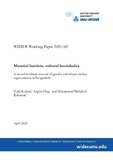Slums During COVID-19: Exploring the Unlocked Paradoxes
Date
2021Publisher
BRAC Institute of Governance and Development (BIGD)Metadata
Show full item recordAbstract
Urban informal settlements commonly known as slums are characterized by a lack of proper housing, tenure security, and have insufficient living spaces and poor access to safe water and sanitation. Due to such living conditions, physical distancing and self-quarantine become virtually impossible in light of the global COVID-19 pandemic, and the rapid spread of infection is deemed to be highly probable. Dhaka is home to more than five million slum dwellers and has the highest number of positive cases in the country (UNICEF, 2020). However, in July 2020, the Institute of Epidemiology Disease Control and Research (IEDCR) shared that the slums of Dhaka had little to no positive cases (Shaheen & Islam, 2020). BRAC Institute of Governance and Development (BIGD) initiated an exploratory study named the “‘Paradox’ of Korail Slum During COVID-19: Ethnography of Governance From Below,” to explain this scenario by understanding the narratives and lived experiences of the slum residents, and how they understood and dealt with the pandemic. To gain a more general and holistic perspective about the slums in Dhaka, we extended this study to two more slums of the city, the Gabtali slum and the Sadek Khan slum. The study took an ethnographic approach and data were triangulated through several qualitative research methods such as in-depth interviews (IDI), key informant interviews (KII) and participatory rapid appraisal. The study revealed how the slum residents themselves used their collective agency to take several robust medical and communal measures to tackle the pandemic.

